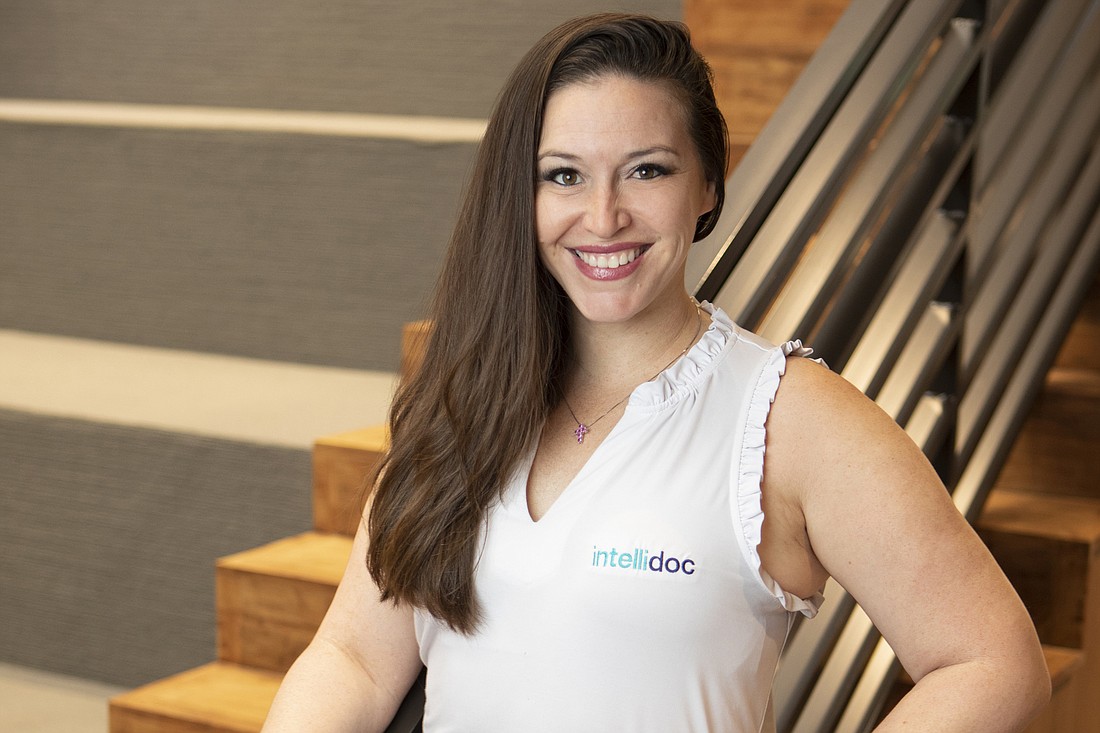- December 15, 2025
-
-
Loading

Loading

Intellidoc is Dr. Jacqueline Darna’s second health care startup of the past decade.
She previously founded NoMo Nausea, a company whose signature product, NoMo Bands, can be used to reduce the severity of morning sickness, motion sickness, sea sickness, postoperative nausea and vomiting, headaches, migraines, irritable bowel syndrome, gastrointestinal irritation and exercise-induced and stress-induced nausea. There are even NoMo Bands to help kids sleep through the night and reduce the effects of motion sickness in dogs.
NoMo Nausea, according to Darna, has generated more than $12 million in gross revenue since it was founded in 2015.
Intellidoc, meanwhile, is a B2B, Software-as-a-Service platform that uses artificial intelligence to make it easier for patients to purchase over-the-counter pharmaceuticals suggested to them by medical professionals during telehealth sessions. The company is still in a pre-revenue, seed-funding stage but Darna estimates it will generate $10-$15 million, on the low end, in its first full year of operation. That number could skyrocket to as much as $250 million depending on how many sales are generated during telehealth sessions.
“We are the revenue-generating piece that telehealth was unable to capitalize on,” Darna says. “We’ll increase telehealth revenue by about $770 million per year and enable $5 billion in retail revenue that was otherwise uncaptured. Those are sexy numbers.”
Darna's biggest concern is not being able to successfully complete Intellidoc’s current funding round.
“Only 2% of women get funded,” she says, “and for women of color like myself — I'm Latina — it’s 0.25%. We’re up against long odds. What happens if I can't end up bringing on the investors that I need in order to finalize and finish the integration with Intellidoc, and then it dies until somebody resurfaces it? I can't help billions of people across the world have better health and wellness if I can't launch this off the ground.”
Looking back, Darna says her biggest mistake was more of a miscommunication, but one that could’ve been easily avoided. She was speaking at conferences in different cities and one of them was home to two different investor groups she had been in touch with regarding funding for Intellidoc.
“The day before, I had had a good investor meeting, so good that I was like, ‘Oh my goodness, this might be the one.’ But I had another group within the same area, and I thought, ‘It would be perfect … what if this is the lead and then this other one is the follow?’ I thought I would be farther down the line with the lead group. Well, I made the mistake of sending an email to the follow group, and they got so excited. And then the lead group said, ‘We didn't say we were committing to anything.’ And I had to backpedal. I was so embarrassed. I got totally called out on it.”
Darna says she didn’t pay enough attention to her communication with the investor groups because she was about to go on vacation for 10 days and would have limited access to email. “I was trying to create that conversation ahead of time,” she says. “I felt really bad about it.”
“Your imagination of what something is to become is literally a foreshadowing of what your life will end up being or what your product will end up being to other people,” Darna says. “If I tell someone in the early stage and they are a naysayer, and they say no, I recognize that I've told the wrong person. So, instead of thinking, ‘Oh, this will never work; this is not going to happen; I'm never going to get funded’ — all of that negative self-talk … instead recognize that that wasn't the right person and find someone else on your journey.”
Darna credits none other than game-show host Steve Harvey, who’s been known to dispense personal and relationship advice on his radio shows, for those words of wisdom.
“When he said that,” she recalls, “I was like, ‘You’re right — I was telling the wrong people.’”
A conversation with officials at CVS turned the tide for Darna and Intellidoc. The call went so well, she says, that another call was scheduled for the next day that included not only CVS, but representatives from the retail giant’s venture capital arm and health care insurance provider Aetna.
“The conversation went like wildfire,” Darna says. “When they want something done, it happens instantly. That was the point where I was like, ‘They’re fighting over me.’”
“Within three to five years is when I plan on an acquisition of Intellidoc by a large retailer and or by an insurance company, or doing an IPO and taking it public,” Darna says. “I've always wanted to ring the [New York Stock Exchange] bell. I was never offered that opportunity with NoMo because it's got a much smaller market share. I hope to not only be in the United States, but also to go global.”
“Somebody told me the other day, ‘I can't believe your side hustle is that you’re a doctor,’” Darna says. “That’s funny. I never really thought of it that way. But I would love to be a professional Latin dancer. I competed when I was younger in bachata and salsa, and I would love to be able to go and dance all over the world.”
“I don't get to dance as much I’d like, but I make a point to take care of myself,” Darna says. “For 10 minutes every day, I read the Bible. It's the best business book I've ever read. Every time, I get something new from it. Then I do something for myself, whether that's Peloton — I wish I could say I did Peloton every day — but honestly, my favorite workout is called Naughty Girl Fitness. It’s basically like a twerk-out. There’s nothing that can solve a bad mood like twerking.”